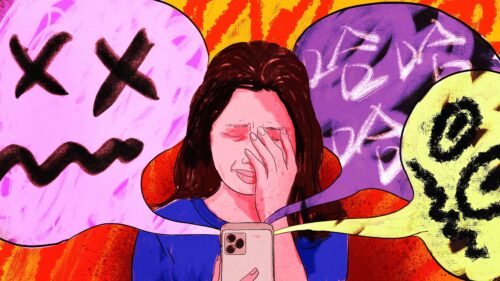Cyberbullying in China finds victims in all corners
Women on the Chinese internet tend to get trolled for their looks and posts about private matters, whereas their male counterparts are more likely to be judged for their opinions on social issues.

Online trolling has become an increasingly common reality for average Chinese internet users, with some individuals falling victim to cyberbullying not even because of what they did, but due to rumors made up by strangers, according to a new study published by a team of researchers from Fudan University.
The findings, based on an analysis of more than 300 cases of cyberbullying that made headlines in China throughout 2022, also revealed a gender disparity in what attracts online vitriol. Women on Chinese social media tend to get attacked for their appearance, accounts of dating, family matters, and alleged attempts to seek attention. In contrast, the study found that men are more likely to be judged for their morality and opinions about public matters.
Misogyny and sexism appear to be core themes in women-targeted cases analyzed in the study, including one where a Chinese female triathlon athlete caught flak for wearing a swimsuit-adjacent outfit that people thought was too revealing. In another case, a college student was accused of attention-seeking and promiscuity after speaking out about being sexually harassed by her married professor.
The study contradicted the idea that celebrities are at greatest risk of being targets of trolls. It found that more than 40% of ordinary Chinese internet users are victimized, almost double the percentage of famous figures in the entertainment industry.
“No one on the Chinese internet is immune to cyberbullying,” the researchers wrote. “When you are caught in the eye of a storm, online trolls don’t even need a legitimate reason to single you out.”
To shine a light on the psychological effects of trolling, the researchers looked into related queries on HaoDF, a leading medical community and appointment booking platform in China. The results showed that women accounted for more than 90 percent of the 48 users who sought medical advice online in 2022. Nearly 60 percent of the individuals who described themselves as victims of cyberbullying said that the mental health issues it caused lasted for more than six six months, with “anxiety,” “insomnia,” and “decreased self-esteem” being the most-mentioned symptoms.
An increasingly pervasive and alarming problem
Published last week, the report follows a string of high-profile cases that have moved the issue of online trolling to the forefront of public consciousness and spurred passionate calls for change.
In January, friends of Zhèng Llínghuá 郑灵华, a 23-year-old college student from Zhejiang Province, announced that she had died by suicide on Chinese lifestyle ecommerce app Xiaohongshu, where the person wrote, “Because of bullying online and in school, Zheng Linghua’s life ended on January 23, 2023.”
In the prior six months, Zheng was a target of relentless trolling on social media. And what exactly did she do? In the summer of 2022, Zheng proudly shared a post on Xiaohongshu celebrating her admission to graduate school alongside her bedridden grandfather. She was quickly picked apart by strangers for sporting pink hair in the photo, with many saying this made her look frivolous and unsuitable for a hospital visit. Thousands of bullies hurled vile abuse at Zheng online, with some creating malicious rumors about her personal life. The attacks caused Zheng serious emotional distress, and eventually led her to take her own life.
Following Zheng’s death, a campaign to raise awareness about her ordeal emerged online. Called “PinkUp,” the initiative saw participants dying their hair pink to express grief and calling for better legislation to combat cyberbullying.
But less than a month later, in another gut-wrenching case spotlighting the harmful effects of cyberbullying, Sūn Fánbǎo 孙凡宝, a short-video influencer who found online fame in 2021 after documenting his 4,000-kilometer trip to Tibet from Shandong on a tractor, ended his life after suffering months of malicious attacks online.
Online trolling has been around for as long as the internet has existed, but a report, released last year by the Institute for a Community with Shared Future of the Communication University of China, showed that it was increasingly becoming an epidemic in today’s society. The report noted that while online vitriol in the early days of Chinese social media was mostly directed at influential figures over ethical issues, more and more ordinary internet users had found themselves attracting the attention of unpleasant people.
“The attacks have become exceedingly sudden, direct, and relentless,” the report pointed out, adding that online aggressive behavior is particularly contagious in China due to its collectivist culture, which is oriented around identifying with a group mentality.
Fighting back
When it comes to solutions, social media platforms are key, the researchers at Fudan suggested, to filter out harmful messages for users under attack. But most of the platforms in China aren’t doing enough to protect their users. In Zheng’s case, she reportedly filed complaints with several Chinese social media sites about the bullying not long after it started, but none of them took prompt and effective action.
For the report, the researchers at Fudan tested how various platforms reacted to derogatory public comments and private messages, finding that Weibo is most tolerant of trolls who make “extremist remarks” and encourage suicidal thoughts. When abuse and harassment takes a less apparent form, such as in memes and rumors, none of the sites under examination — including Weibo, Bilibili, and Douyin — were able to identify and intervene automatically. For now, the most effective way for Chinese internet users to exit a bullying situation is to enable a “protection” feature that allows them to stop messages from strangers, restrict comments, and hide their accounts from searching.
While most platforms have been taking steps to improve safety, calls for anti-cyberbullying laws have continued to grow. In the wake of Zheng’s death, multiple delegates at this year’s National People’s Congress focused their proposals on the issue and urged legislators to make cyberbullying a criminal offense.
In an indication of how deeply the Chinese public cares about cyberbullying, the most popular film at Chinese cinemas this month is squarely about the issue: Post-Truth (保你平安 bǎo nǐ píng ān), a homegrown comedy about a sales representative at a cemetery trying to stamp out negative misinformation about his female client after she passed away, has dominated the Chinese box office for over two weeks, hauling in more than 400 million yuan ($58 million) and beating out Hollywood superhero tentpole Shazam! Fury of the Gods.





